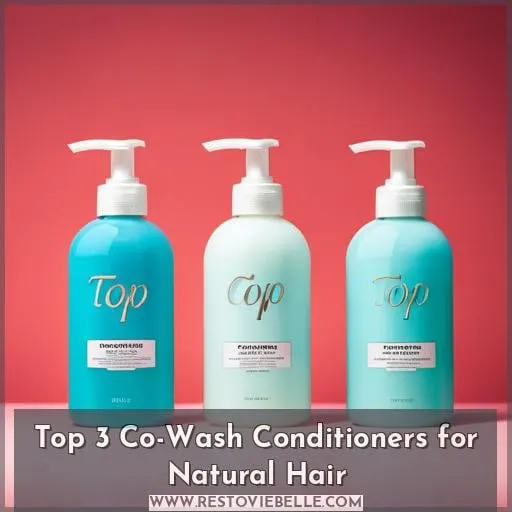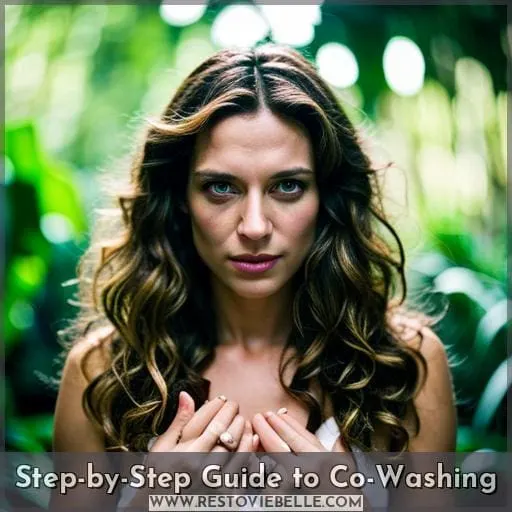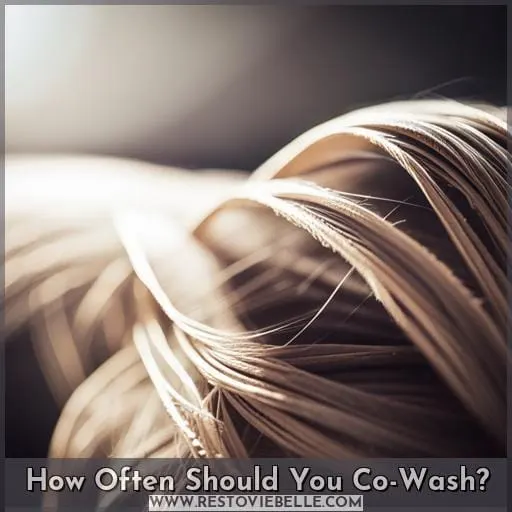This site is supported by our readers. We may earn a commission, at no cost to you, if you purchase through links.
 Have you ever stopped to ask yourself, What is co-washing? You’re not alone. Co-washing has become a popular hair care routine for many women with natural, curly or mixed textured hair looking to keep their locks hydrated and healthy without drying out their strands.
Have you ever stopped to ask yourself, What is co-washing? You’re not alone. Co-washing has become a popular hair care routine for many women with natural, curly or mixed textured hair looking to keep their locks hydrated and healthy without drying out their strands.
So let’s delve into what co-washing really is and why it might just be the perfect addition to your haircare regime.
As well as being gentle on dry or damaged hair, this method also hydrates both your scalp and locks which helps maintain a balanced moisture level throughout each strand for shiny softness that won’t break apart over time.
Not only does it help restore vibrancy but you can say goodbye to harsh chemicals too; most cleansing conditioners are free from sulfates making them nonstripping alternatives ideal for color-treated tresses too.
Table Of Contents
- Key Takeaways
- What is Co-Washing?
- The Benefits of Co-Washing
- Co-Wash Vs. Shampoo: Which is Better?
- How Does Co-Washing Differ From Regular Conditioning?
- Top 3 Co-Wash Conditioners for Natural Hair
- Step-by-Step Guide to Co-Washing
- How Often Should You Co-Wash?
- Is Co-Washing Suitable for Curly Hair?
- Is Co-Washing Suitable for 4C Hair?
- Is Co-Washing Suitable for Wavy Hair?
- Conclusion
Key Takeaways
- Co-washing is a popular hair care routine for curly and mixed-textured hair.
- It involves using conditioner instead of shampoo to maintain moisture.
- Benefits of co-washing include gentle cleansing, scalp hydration, and non-stripping of oils.
- Co-washing is suitable for curly, coily, and afro-textured hair types.
What is Co-Washing?
Co-washing is a gentle alternative to shampooing that helps retain moisture and hydration for healthier hair, so you can achieve the look you want without sacrificing your locks’ natural luster. Co-washing with conditioner only allows your scalp to stay balanced in its pH levels while retaining essential oils.
It’s popular among those with curly or coily hair as it keeps their curls from drying out, which could lead to breakage and other damage. Benefits of co-washing include gentle cleansing, scalp hydration, non-stripping of natural oils, and removal of excess oil and flaking on the scalp; all important factors when trying to maintain healthy hair growth.
When looking for a suitable co-wash product, be sure it contains ingredients like emollients, proteins, humectants, moisturizers, honey, glycerin, shea butter, etc. Also, try not to use products containing silicones as they may cause build-up over time, leading to contact dermatitis, reduced product effectiveness, and uncomfortable itchiness on your skin.
Frequency depends upon the type, texture, thickness, or oiliness of your hair, but generally washing every 7 – 10 days should suffice if using an appropriate sulfate-free shampoo once a month, plus occasional clarifying shampoos to keep it well maintained and cleanse covered.
Last but not least, expert customer care staff recommended personalized haircare advice and safe practices to ultimately attain desired results!
The Benefits of Co-Washing
Are you looking for a gentle and effective way to cleanse your dry hair while still preserving its natural moisture? Co-washing is an excellent option that not only hydrates the scalp but also doesn’t strip away essential oils from your hair.
Gentle for Dry Hair
For dry hair, co-washing helps to maintain natural moisture levels while gently cleansing and hydrating your scalp. It allows you to keep the great benefits of shampoo but without stripping away essential oils.
Frequent co-wash use can help prevent contact dermatitis and product buildup on your scalp.
Scalp hydration is key for curly or coarse hair care, so find a lightweight yet moisturizing conditioner that works best for you! With frequent co-washing comes healthier-looking curls – no more dullness or breakage!
Hydrates the Scalp Too
You can keep your scalp hydrated with co-washing, an effective alternative to shampooing that helps retain moisture. It’s beneficial for afro, mixed-textured, curly, or dry hair types as it maintains natural moisture levels.
Co-washing also removes excess oil and scalp flaking while retaining essential oils.
Products like Afrocenchix Swirl Silicone Free Conditioner and Pantene Gold Series Deep Hydrating CoWash work well on all textures without stripping away natural sebums needed to seal in the moisture. Frequency depends on individual needs but washing every 7 – 10 days is usually enough, while occasional clarifying shampoos are required once a month for build-up prevention.
Non-Stripping
By co-washing, your hair gets the benefit of gentle cleansing without stripping away natural oils. This is one of the biggest non-stripping benefits as it helps to preserve and protect hair from product buildup.
Co-wash ingredients like emollients, proteins, humectants, and moisturizers are important for nourishing locks too! When it comes to techniques for using a co-wash product correctly, massaging into roots is key.
Also, remember to choose silicone-free options when possible and follow up with sulfate-free shampoo every 7-10 days.
Co-Wash Vs. Shampoo: Which is Better?
Comparing co-washing and shampooing, you’ll find that each has its own pros and cons that must be weighed when making a decision.
Co-washing is an effective way to cleanse without stripping your hair of natural oils with sulfate ingredients found in shampoos. However, it may not be enough on its own if you’re prone to scalp buildup or have very oily hair.
Occasional traditional cleansing with sulfate-free shampoo is recommended for such cases.
The frequency at which you should use either also depends on the type of your hair. Those using fewer styling products can usually co-wash around twice a month, while oilier scalps may benefit from weekly washes instead.
When choosing conditioners for regular co-washes, look out for emollients like honey and shea butter, as well as proteins and humectants – all crucial components of efficient moisturizing agents!
To get the best results possible, consider trying out some popular brands such as Pantene Gold Argan CoWash or Shea Moisture Coconut Hibiscus CoWash, among many others available today.
With careful consideration into their differences plus personal preferences, both methods can help keep curly locks looking healthy over time, depending on how often they’re used.
How Does Co-Washing Differ From Regular Conditioning?
Unlike regular conditioning, co-washing is a cleansing technique that focuses on hydration rather than removing dirt or buildup.
- Regular Conditioning vs. Co Washing: While both involve using conditioners to moisturize and nourish hair, co-washing does not use any detergents like sulfates, which can strip away natural oils from the scalp.
- Co Washing Benefits: It helps retain moisture levels in all types of textured hair while gently cleansing and lifting away excess oil without stripping it off completely.
- Co Washing Frequency: Depending on your individual needs (oily scalps may require more frequent washes), most people can get away with washing their locks every 7-10 days with a gentle sulfate-free shampoo if needed, at least once per month for clarifying purposes too!
- Especially For Curly Hair & Fine Hair Types: Those who have 4C type curls should look for richer formulas when choosing their products, whereas those blessed with fine tresses need something lightweight yet equally hydrating, such as Afrocenchix Swirl Silicone Free Conditioner or Pantene Gold Series Deep Hydrating Wash instead!
Overall, co-washing remains an excellent way to keep your mane feeling soft without causing any damage whatsoever, even after repeated uses, providing you take extra care when selecting appropriate formulations suitable for each unique texture type present in our amazing world of diverse hairstyles today!
Top 3 Co-Wash Conditioners for Natural Hair
Are you searching for the best co-wash conditioners for natural hair? Look no further! Pantene Gold Argan CoWash, Shea Moisture Coconut Hibiscus CoWash, and Live Clean Apple Cider Conditioner are three of the top-rated products on the market.
These luxurious formulas help cleanse, moisturize, and soften your curls while providing essential nutrients that promote healthy growth.
Pantene Gold Argan CoWash
Pantene’s Gold Argan CoWash promises powerful protection for your precious puffs. Infused with Argan Oil, this paraben-free and sulfate-free formula helps reduce hair fall and improve scalp condition while moisturizing, softening, and detangling curly or coily hair.
Recommended for use twice a month (more often if needed), it can replace shampoo/conditioner to provide nourishing hydration without stripping natural oils like other cleansers might.
Shea Moisture Coconut Hibiscus CoWash
Shea Moisture Coconut Hibiscus CoWash provides gentle cleansing, scalp hydration, and non-stripping action for natural hair. Its rosemary and coconut ingredients cleanse without stripping away the essential oils that keep your curls bouncy.
It can be used on all hair types, but users should use less product than usual as it’s more expensive than other co-washing conditioners. Some found it a bit drying, so leaving it in for 5-8 minutes will help ensure you get the full benefit from this product’s moisturizing properties while avoiding a feeling of buildup afterward.
For those looking to switch up their curl care routine with an effective co-wash frequency, Shea Moisture could be worth trying out!
Live Clean Apple Cider Conditioner
Live Clean Apple Cider Conditioner revitalizes your hair with a fresh scent and lightweight, non-greasy formula. This hypoallergenic, vegan conditioner contains certified organic chamomile extract and sunflower seed oil to restore moisture while removing dulling residue.
Perfect for all hair types, this cruelty-free product is 98% plant-based and won’t weigh down locks.
Step-by-Step Guide to Co-Washing
Are you interested in learning how to co-wash your hair? Co-washing is a great way to cleanse and hydrate curly, mixed-textured, or dry hair types. To get the best results from this process, it’s important to start with a rinse first.
Avoid jumping straight into coating your hair with conditioner. Use the right amount of conditioner for optimal cleansing benefits. Apply it evenly throughout strands for even coverage and distribution. Massage the product into roots deeply enough that scalp buildup can be addressed, then rinse and repeat if necessary.
Rinse First, Don’t Jump Straight to Coating Your Hair
Before starting your co-washing routine, always rinse your hair first to remove any dirt or product buildup. This pre-wash step is important for all styling habits and curl types, especially if you suffer from an oily scalp.
Rinsing helps ensure the co-washing benefits of hydration, gentle cleansing, and scalp health are maximized without causing irritation. Use warm water to open the cuticles on curly strands before coating them with conditioner for a deeper cleanse that won’t strip away natural oils.
Following these simple co-wash techniques will help you get maximum results from this popular curly hair care method!
Use the Right Amount of Co-Wash
When co-washing, make sure to use the correct amount of conditioner for your hair type – not too much and definitely not too little. Oily scalps may require more product than dry scalp types, while fine hair benefits from a lightweight yet moisturizing co-wash.
Avoiding styling products can reduce product buildup and help maintain curl definition; leave some conditioner in or add leave-in after washing for coarse/curly hair types. Consider ingredients like emollients, proteins, and humectants to hydrate without stripping natural oils away.
Apply the Co-Wash Evenly
Spread the co-wash evenly throughout your hair, focusing on the roots and scalp. Take into account product selection, detangling techniques, and scalp hydration for the best results. Hair texture compatibility is key – choose a hair care range that caters to yours.
Expert staff can help find the perfect fit! Don’t forget: even co-washing is essential for healthy locks.
Work the Co-Wash Into Your Roots
Gently massage the co-wash into your roots, working it in circular motions to help remove excess oils and buildup. Scalp massages with a conditioner strengthen hair follicles, promoting healthier growth while retaining moisture.
Detangling tips, such as using fingers instead of a comb, can also be helpful when applying product for best results.
Product selection is key. Great options for co-washing include Afrocenchix Swirl Silicone-Free Conditioner or Live Clean Apple Cider Ultra Light Conditioner. These conditioners provide hydration and gentle cleansing, allowing you to take advantage of their benefits.
To further enhance your haircare routine, consider consulting an expert via virtual consultation for personalized advice. They can provide tailored recommendations based on your specific needs. Additionally, you can try using Super Milk to maintain the shape of your curls while adding shine.
Rinse and Repeat
Once you’ve worked the co-wash into your scalp and throughout your hair, it’s time to rinse! For two minutes or more, use lukewarm water to thoroughly wash out the product. It is important not to repeat usage too often as this can lead to dryness and scalp irritation.
To ensure a healthy hair texture and prevent scalp buildup, consider using a sulfate-free shampoo occasionally in between co-washing sessions. There are many great product recommendations available for all different types of curly/coily textures that will help keep your tresses hydrated while maintaining optimal health.
How Often Should You Co-Wash?
Frequency of co-washing varies depending on your hair type and scalp oiliness. Generally, those with afro or mixed texture curly hair benefit from weekly co-washing to keep their locks hydrated and healthy.
However, if you have finer curls that are more prone to dryness, then two weeks may be a better interval for regular washing as this will help maintain the natural oils in the scalp while still providing enough moisture.
For those with oily scalps, washing every 7-10 days is best as overdoing it can lead to product buildup, which can cause irritation or contact dermatitis.
When deciding how often you should co-wash, there are several factors that need consideration:
- Hair Type: Coarser textures require more frequent washes than fine strands.
- Scalp Health: Oily scalps need less frequent cleansing compared to dryer types.
- Product Recommendations: Choose sulfate-free cleansers when possible.
- Curly Hair Care: Detangling should be done before rinsing out conditioner for optimal results.
- Moisture Balance: Avoid using too many styling products, which could lead to an unbalanced amount of moisture in the strands.
Finding what works best for each individual requires trial and error, but following these guidelines is a good place to start! With so many different formulas available, finding one tailored specifically towards your curl pattern has never been easier! From lightweight conditioners suitable for finer tresses all the way through richer options perfect for 4C hair, everyone deserves access to quality haircare regardless of their budget!
Is Co-Washing Suitable for Curly Hair?
Co-washing is a great option for those with curly hair looking to maintain their natural moisture levels. Unlike traditional shampooing, which can strip away oils, co-washing focuses on hydration rather than cleansing.
It’s important to choose the right conditioner in order to achieve the best results. Look for products that contain emollients, proteins, humectants, and moisturizers like honey and shea butter.
Depending on your hair type and the oiliness of your scalp, you may need more frequent washing (weekly) or less often (every 7-10 days). When selecting a conditioner, be sure that it does not contain silicones as they tend to coat the cuticle layer, preventing proper hydration from occurring and leading to dry, brittle hair strands.
Also, remember that occasional clarifying shampoos are needed once a month so that build-up doesn’t occur. This can result in contact dermatitis, reduced product effectiveness, and an itchy scalp.
With regular use of these tips and techniques, you will find beautiful, healthy curls full of life!
Is Co-Washing Suitable for 4C Hair?
You can tailor your co-wash to 4C hair with the right ingredients and process – look for conditioners packed with emollients, proteins, humectants, and moisturizers. A rich formula is best for this type of hair because it helps seal in moisture. For fine 4C strands, opt for a lightweight yet highly moisturizing co-wash that won’t weigh down your curls or leave them feeling greasy.
Massage the product into the scalp thoroughly to remove all dirt buildup while keeping natural oils intact. Take special care when detangling; use fingers before rinsing out all residue from roots to ends.
To ensure optimal scalp health and maximum moisture retention, avoid shampoos containing sulfates, which strip away beneficial oils from the skin and hair shafts alike. Incorporating regular sulfate-free shampooing every 7-10 days will also help keep any buildup at bay without compromising hydration levels.
Additionally, adding additional products such as curl power or super milk specifically designed for those with curly locks will help maintain healthy manageable styling options.
Is Co-Washing Suitable for Wavy Hair?
Co-washing is an effective way to clean and condition wavy hair. It’s a great alternative to traditional shampooing because it doesn’t strip the natural oils from your strands like sulfate-based shampoos do.
The key is selecting the right co-wash product for your specific needs and following up with occasional clarifying washes when necessary.
Despite misconceptions, there are many benefits of using a co-wash on wavy hair. It helps preserve moisture levels in between regular cleanses, removes excess oil buildup that can cause scalp flaking or itching, and reduces frizziness due to lack of hydration compared to shampooing only.
When choosing a co-wash product for wavy hair types, specifically look for ingredients like emollients (oils), proteins (for strength and protection), humectants (moisture keepers), moisturizers, and shea butter.
These ingredients help restore balance in each strand while gently cleansing without stripping away important nutrients needed for healthy tresses over time.
Regular maintenance will allow you to achieve softer waves. However, it’s important to remember that not every type 4C curly hair fits into one category, so be mindful when finding the right products suited just for you!
Conclusion
You’ve now discovered the wonders of co-washing! This method of cleansing your hair is gentle, hydrating, and non-stripping. It’s suitable for all hair types, from curly to 4C hair. Plus, you can choose from a variety of co-wash conditioners to get the perfect balance of cleansing and hydration for your hair.
With the right co-wash, you can keep your hair healthy, fresh, and moisturized. Don’t forget to balance co-washing with occasional shampooing to remove buildup and ensure your scalp’s health.














